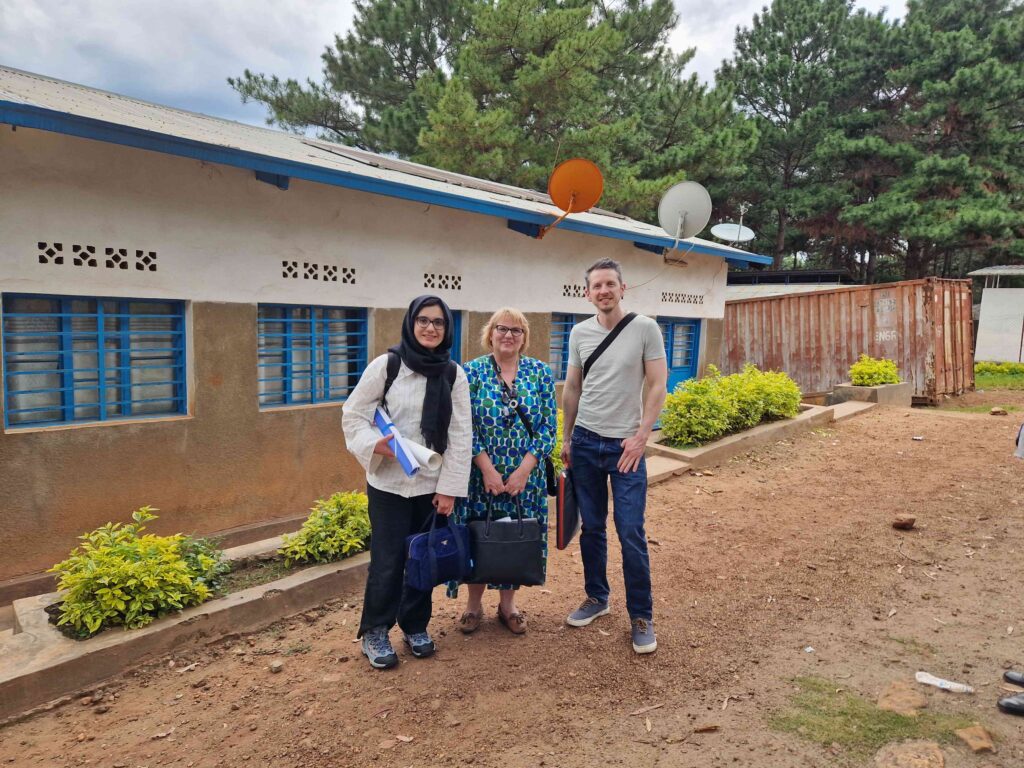In this blog, Professor Laura Abbott from the University of Hertfordshire describes how a decade of qualitative research into pregnancy and maternal separation in prison led to landmark sentencing reforms earlier this year.
“Pregnancy and early motherhood in prison constitutes a complex intersection of health and justice systems that presents considerable challenges for effective, compassionate care.
Over the past decade, my research has sought to shed light on this often-overlooked context, where the responsibilities of clinical and custodial staff converge (by necessity), but frequently do so in ways that complicate care pathways.
High-risk pregnancies and systemic failures
Each year, approximately 200 pregnant women are detained in prisons across England and Wales, and more than 50 babies are born to women in custody. NHS England classifies all pregnancies in prison as “high risk”; however, service provision in these settings can be inconsistent and reactive.
Frontline staff, including midwives and prison officers, have reported persistent staffing shortages, fragmented communication between healthcare and prison services, and limitations in emergency planning – factors which, on occasion, have resulted in adverse outcomes. These preventable harms were starkly revealed by the deaths of two babies born in English prisons in 2019 and 2020, both of which prompted national inquiries.
As I and colleagues have recently written in The BMJ (2025), such incidents expose not only the absence of effective safeguards but also the deeper moral question of why imprisonment remains an acceptable response to women’s social and health vulnerabilities. Prisons were never designed to meet the needs of pregnant women, yet they have become default sites of containment for those facing poverty, abuse, trauma, and substance dependency.
It was through this urgent context that I founded the Lost Mothers Project (supported by the Economic and Social Research Council (ESRC) and delivered in partnership with the charity Birth Companions and lived experience members).
The project explores the experiences of mothers involved in the criminal justice system who have been separated from their newborn babies, particularly those subjected to compulsory separation from their babies, as well as the perspectives of the professionals surrounding them.
Voices from Inside
Using qualitative methods, we conducted in-depth interviews with women, prison and health staff and social workers.
Women’s narratives revealed the devastating consequences of forced separation and the institutional blind spots that perpetuate it. They described fear during labour, a lack of control over their bodies, and the emotional violence of losing a newborn with little explanation or support. Many spoke of grief comparable to bereavement but compounded by stigma and isolation. Staff interviews, meanwhile, showed uncomfortable tensions between policy obligations and personal ethics. Health and prison workers frequently expressed frustration at operating within systems that thwart compassionate practice:
“She was doing everything right. She’s done everything that they’ve asked her to do, but then the courts have decided no. So then you’re supporting a mum that’s literally grieving for a child, which is, it is difficult, because she knows that she’s lost him and the likelihood of her getting him back is going to be minimal. So she’s grieving for that child that she’s lost, even though he’s still here, she’s still grieving for him. It is difficult. It’s difficult for them, and it’s difficult for staff.” Testimony from a Prison worker
“The worst thing I could say I’ve ever experienced in this life, is the separation… They literally take a piece of your heart… It’s like they leave enough to keep it beating, and the rest of it has gone…” Testimony from a woman
Founding the Lost Mothers Project
The Lost Mothers Project also sought to move research beyond documentation towards advocacy and cultural change. In collaboration with Clean Break Theatre Company, Scenes from Lost Mothers – a play was written by the highly acclaimed Gurpreet Kaur Bhatti.
The play enabled audiences, including policymakers and practitioners, to encounter evidence as emotion and testimony, bridging academia and lived experience. Evaluations demonstrated the effectiveness of creative dissemination in humanising marginalised stories while influencing professional empathy and understanding.
Evidence influencing policy and guidance
At the policy level, the project’s evidence has fed directly into reform. In April 2025, the Sentencing Council for England and Wales introduced landmark guidance explicitly recognising pregnancy and the postnatal period as mitigating factors in sentencing decisions. This change, supported by data from our research, advocacy by Birth Companions, and sustained engagement with the Sentencing Council, represents a significant policy milestone. For the first time, courts are instructed to avoid custodial sentences for pregnant or postnatal women except in exceptional circumstances, acknowledging the health risks and ethical tensions inherent in carceral maternity care.
The impact of this reform extends beyond sentencing itself. It signals a cultural shift: an understanding that pregnancy is not incidental to punishment, but central to the moral calculus of justice. It also reinforces a broader evidence base, now reflected in guidance from NHS England, the Royal College of Midwives, and the Prison and Probation Ombudsman, recognising that incarceration compromises maternal health outcomes and infant wellbeing.
Being shortlisted for the Research and Innovation Impact Award at the Alliance Awards 2025 has been an opportunity to reflect on the collective nature of this work. It belongs as much to the women who shared their stories as to the academic and advocacy partners who amplified them. Their voices have transformed abstract evidence into moral urgency, challenging policymakers to rethink how justice, health, and humanity intersect.
The legacy of this research lies not only in its policy impact but in its reframing of ethical responsibilities: illuminating how systems may perpetuate harm under the guise of neutrality and demonstrating how evidence, empathy, and advocacy can together advance social justice. Future plans for this work centre on continuing research and advocacy in partnership with women who have lived experience, maintaining their voices at the heart of the project. The aim is to collaborate with government, sector partners, and charities to ensure that the needs and rights of women and their babies remain central to policy and practice, driving lasting change in maternity care and justice.”
Further reading
The Lost Mothers Project: Revealing the Hidden Trauma of Maternal Separation in Prison – Clean Break.
Watch the Lost Mothers Project mentioned in Parliament.
Website: www.lostmothers.org
Relevant publications:
Abbott, L., Kitchen, K. Capper. T, Davies. M, Baldwin. L., (2025). Maternity Provision for Incarcerated Women in the UK: Bridging Gaps in Clinical Care. The British Medical Journal. 2025;388:e080445
Abbott, L., Chivers, K. & Moncrieffe, T. (2024). Co-production in the Lost Mothers Project: transforming criminal justice narratives through Lived experience engagement. Res Involv Engagem 10, 53 (2024). https://doi.org/10.1186/s40900-024-00583-1
Abbott, L., 2024. Meeting the needs of pregnant women and new mothers in prison. International Journal of Birth and Parent Education. Vol. 11. Issue. 4
Abbott, L., Scott, T., & Thomas, H. (2024). Institutional thoughtlessness and the incarcerated pregnancy. Criminology & Criminal Justice, 0(0). https://doi.org/10.1177/17488958241228995[LA9]
Abbott, L., Scott, T. and Thomas, H., 2023. Experiences of midwifery care in English prisons. Birth, 50 (1), pp.244-251.
Abbott, L., Scott, T. and Thomas, H., 2021. Compulsory separation of women prisoners from their babies following childbirth: Uncertainty, loss and disenfranchised grief. Sociology of Health & Illness.
Abbott, L., Scott, T. and Thomas, H., 2023. Experiences of midwifery care in English prisons. Birth, 50 (1), pp.244-251.
Abbott, L., Scott, T. and Thomas, H., 2021. Compulsory separation of women prisoners from their babies following childbirth: Uncertainty, loss and disenfranchised grief. Sociology of Health & Illness.




